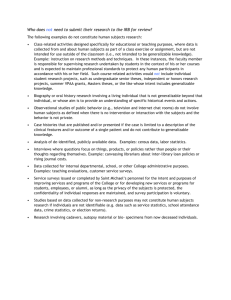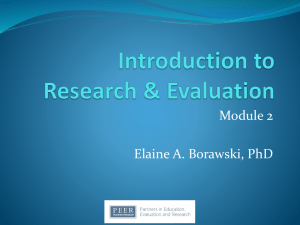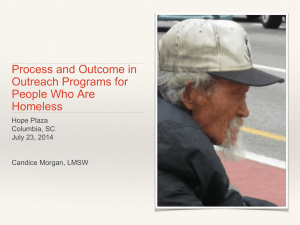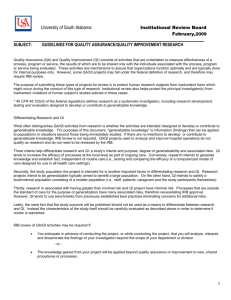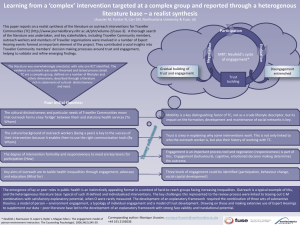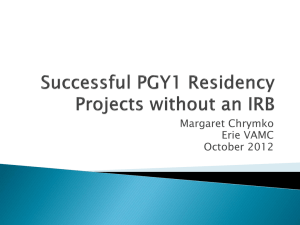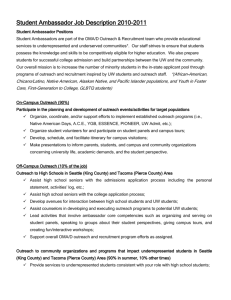Defining Community Outreach Research and
advertisement
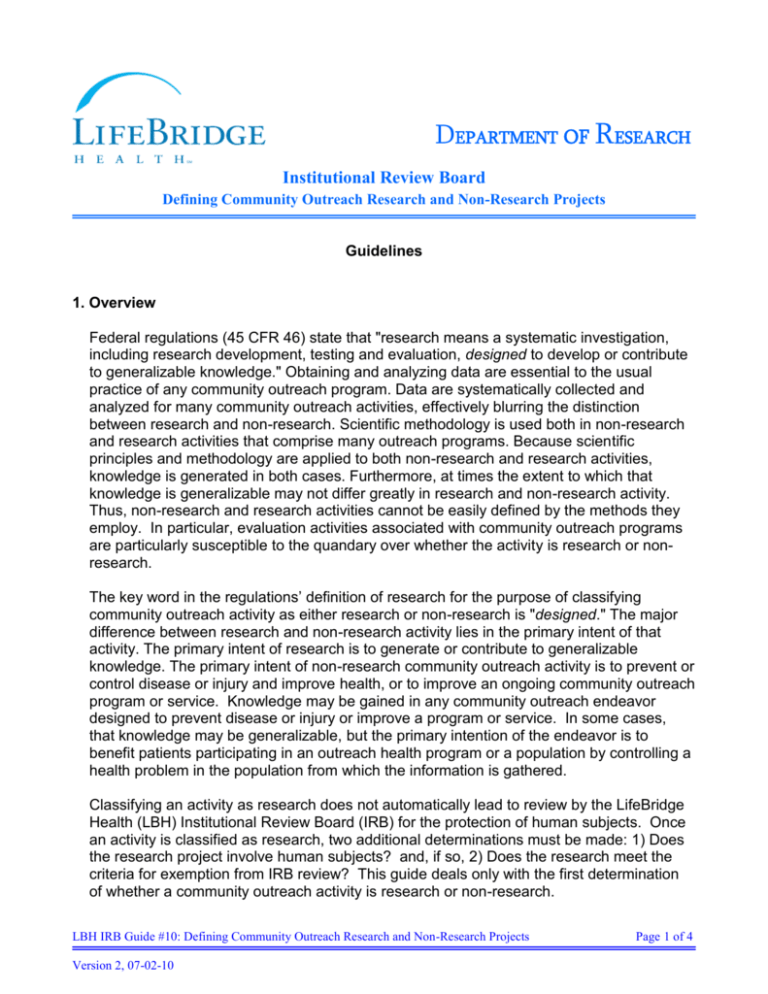
DEPARTMENT OF RESEARCH Institutional Review Board Defining Community Outreach Research and Non-Research Projects Guidelines 1. Overview Federal regulations (45 CFR 46) state that "research means a systematic investigation, including research development, testing and evaluation, designed to develop or contribute to generalizable knowledge." Obtaining and analyzing data are essential to the usual practice of any community outreach program. Data are systematically collected and analyzed for many community outreach activities, effectively blurring the distinction between research and non-research. Scientific methodology is used both in non-research and research activities that comprise many outreach programs. Because scientific principles and methodology are applied to both non-research and research activities, knowledge is generated in both cases. Furthermore, at times the extent to which that knowledge is generalizable may not differ greatly in research and non-research activity. Thus, non-research and research activities cannot be easily defined by the methods they employ. In particular, evaluation activities associated with community outreach programs are particularly susceptible to the quandary over whether the activity is research or nonresearch. The key word in the regulations’ definition of research for the purpose of classifying community outreach activity as either research or non-research is "designed." The major difference between research and non-research activity lies in the primary intent of that activity. The primary intent of research is to generate or contribute to generalizable knowledge. The primary intent of non-research community outreach activity is to prevent or control disease or injury and improve health, or to improve an ongoing community outreach program or service. Knowledge may be gained in any community outreach endeavor designed to prevent disease or injury or improve a program or service. In some cases, that knowledge may be generalizable, but the primary intention of the endeavor is to benefit patients participating in an outreach health program or a population by controlling a health problem in the population from which the information is gathered. Classifying an activity as research does not automatically lead to review by the LifeBridge Health (LBH) Institutional Review Board (IRB) for the protection of human subjects. Once an activity is classified as research, two additional determinations must be made: 1) Does the research project involve human subjects? and, if so, 2) Does the research meet the criteria for exemption from IRB review? This guide deals only with the first determination of whether a community outreach activity is research or non-research. LBH IRB Guide #10: Defining Community Outreach Research and Non-Research Projects Version 2, 07-02-10 Page 1 of 4 2. Policy The LBH IRB is not only required to but has an ethical obligation to ensure that individuals are protected in all research activities conducted by LBH staff. All LBH activities involving patient participation beyond that which normally occurs during clinical practice must be reviewed to determine whether that activity is research involving human subjects. Some community outreach programs are research involving human subjects; others are not. Each project must be reviewed on a case-by-case basis. Although general guidance can be given to assist in classifying these activities as either research or non-research, no one criterion can be applied universally. The ultimate decision regarding classification lies in the intent of the project. If the primary intent is to generate generalizable knowledge, the activity is research. If the primary intent is to prevent or control disease or injury or to improve a LBH community outreach program, and there is no intent to generate generalizable knowledge at the present time, the project is non-research. If the primary intent changes to generating generalizable knowledge, then the project becomes research. 3. GUIDANCE FOR COMPLIANCE A. General The LBH IRB Chairman or his designate will determine whether a particular project constitutes research. If the Chairman or his designate is unsure about classifying a project, the matter will be considered by the full IRB. This determination will be made by examining the intent of the project. Clinicians and researchers alike can simplify this step by clearly stating the primary purpose for which the project was designed. General Attributes of Community Outreach Research - Intent of the project is to generate generalizable knowledge to improve community outreach practice; intended benefits of the project may or may not include study participants, but always extend beyond the study participants, usually to society; and data collected exceed requirements for care of the study participants or extend beyond the scope of the activity. Generalizable knowledge means new information that has relevance beyond the population or program from which it was collected, or information that is added to the scientific literature. Knowledge that can be generalized is collected under systematic procedures that reduce bias, allowing the knowledge to be applied to populations and settings different from the ones from which it was collected. Generalizable, for purposes of defining research, does not refer to the statistical concept of population estimation or to the traditional public health method of collecting information from a sample to understand health in the population from which the sample came. Holding community outreach activities to a standard of studying every case in order to classify an activity as non-research is not practical or reasonable. General Attributes of Community Outreach Activity (Non-Research) - Intent of the project is to identify and control a health problem or improve a community outreach program or service; intended benefits of the project are primarily or exclusively for the participants (or patients) or the participants’ community; data collected are needed to LBH IRB Guide #10: Defining Community Outreach Research and Non-Research Projects Version 2, 07-02-10 Page 2 of 4 assess and/or improve the program or service, the health of the participants or the participants’ community; knowledge that is generated does not extend beyond the scope of the activity; and project activities are not experimental. Other attributes, such as publication of findings, statutory authority (see discussion in next section), methodological design, selection of subjects, and hypothesis testing/generating, do not necessarily differentiate research from non-research activity because these types of attributes can be shared by both research and non-research projects. A non-research project may generate generalizable knowledge after the project is undertaken even though generating this knowledge was not part of the original, primary intent. In this case, since the primary intent was not to generate or contribute to generalizable knowledge, the project is not classified as research at the outset. However, if subsequent analysis of identifiable private information is undertaken to generate or contribute to generalizable knowledge, the analysis constitutes human subjects research that requires IRB review. If a project includes multiple components and at least one of those components is designed to generate generalizable knowledge, then the entire project is classified as research unless the components are separable. B. Specific 1) Evaluation - The systematic application of scientific and statistical procedures for measuring program conceptualization, design, implementation, and utility; making comparisons based on these measurements; and the use of the resulting information to optimize program outcomes. 2) Program Evaluation – An essential organizational practice in public health using a systematic approach to improve and account for public health actions. These terms are used interchangeably. Yet, as the above definitions imply, there are subtle differences between the two terms. Evaluation is broad in meaning, and refers to the systematic use of scientific methods to measure efficacy, implementation, utility, and so on of a program in its entirety or its components. Evaluations may or may not be research. Program evaluations are a subset of evaluations. As defined here program evaluations are almost never research. When the purpose of an evaluation is to test a new, modified, or previously untested intervention, service, or program to determine whether it is effective, the evaluation is research. The systematic comparison of standard or non-standard interventions in an experimental-type design is research. In these cases, the knowledge gained is applicable beyond the individual, specific program. Thus, the primary intent is to generate new knowledge or contribute to the knowledge in the scientific literature. Further, it is intended to apply the knowledge to other sites or populations. LBH IRB Guide #10: Defining Community Outreach Research and Non-Research Projects Version 2, 07-02-10 Page 3 of 4 When the purpose is to assess the success of an established program in achieving its objectives in a specific population and the information gained from the evaluation will be used to provide feedback to that program, the evaluation, referred to as program evaluation, is non-research. In the non-research scenario, the evaluation is used as a management tool to monitor and improve the program. The evaluation activity is often a component of the regular, ongoing program. Information learned from the evaluation has immediate benefit for the program and/or the patients receiving the services or interventions. The information is often not generalizable beyond the individual program. Interventions and services that are evaluated are never experimental or new; they are known (either from empirical data or through consensus) to be effective. The data are generally used at the local level as a management tool as well as at the national level for the same purpose. Sometimes, the term "formative evaluation" is used to describe data collection activities that occur prior to the implementation of an intervention, service, or program. Whether the "formative evaluation" is research or non-research depends upon its intent. If the evaluation is conducted prior to implementing a new, modified, or previously untested intervention, the evaluation is part of the overall research project. If the evaluation is conducted to provide information on how to tailor a proven-effective intervention, service, or program in a specific setting or context, the evaluation is not research. In some cases, program activities and evaluation activities are separable. For example, interventions or services are being provided; they have a history of being provided and there is an intention to continue to provide them. An evaluation is conducted to determine the efficacy of these program activities. In this example, because the intervention and evaluation activities are undertaken with different intentions and are separable, the intervention activities are not research but the evaluation activities are research. LBH IRB Guide #10: Defining Community Outreach Research and Non-Research Projects Version 2, 07-02-10 Page 4 of 4
